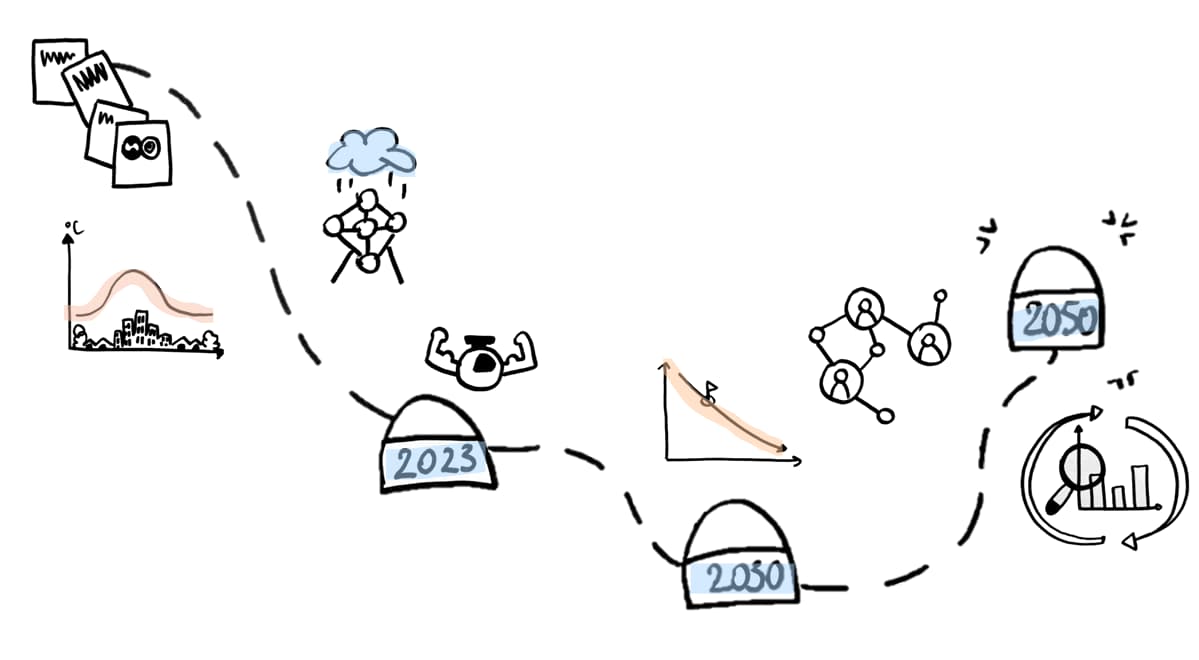
The City of Brussels has drawn up a Climate Plan aimed at achieving carbon neutrality by 2050 and adapting its territory to the effects of climate change.
- Climate Plan for the territory of the City of Brussels (1.94 MB)
- Climate Plan for the territory of the City of Brussels - summary document (1.13 MB)
Progress of the Climate Plan
Cities have a central role to play in limiting climate change and protecting people from its consequences. Flooding, heat islands, loss of biodiversity: in Brussels, the effects of climate change are already very real. In order to play its part in lightening change and developing adaptive solutions, the City of Brussels adopted a new Climate Plan in 2022.

- 2008-2020: Agenda 21 - The City of Brussels' action plan for sustainable development
- 2018: 'We are the change' - First Climate Plan of the City of Brussels
- 2019: Declaration of a state of 'Climate Emergency' by the City Council of the City of Brussels
- 2021-2022: 46 meetings and workshops as part of the participatory process to develop the Climate Plan
- 12 December 2022: approval and adoption of the 2.0 Climate Plan
- 2023: first evaluation of the Plan internal to the City of Brussels
- 2024: setting up of the Local Climate Assembly
- 2024-2030: biannual assessment and adaptation of the Plan with the Local Climate Assembly
- 2030: -55% of the territory's greenhouse gas emissions compared to 2008
- 2040: carbon neutrality of public buildings
- 2050: carbon neutrality of the territory of the City of Brussels
At the end of 2022, the City of Brussels adopted an ambitious new Climate Plan. The first evaluation is made at its first anniversary:
Infographic - Evaluation 2024 of the Climate Plan (637.64 KB) (in French)
To find concrete solutions that take into account the realities of its population, the City of Brussels organised a wide-ranging participatory process in 2021: almost 700 citizens worked in 46 meetings and workshops, giving rise to more than 300 ideas for action, which were then integrated by experts within the municipality into the Climate Plan.
- Results of the citizen participation (in French)
- Results of the citizen participation (1.61 MB) (in Dutch)
A roadmap organised around 11 major themes - from energy and water to mobility, waste and food - the Climate Plan sets out 150 strategic objectives, broken down into hundreds of practical actions, to ensure that we work together effectively to protect the region's climate. The aim of all these actions is to:
- reduce greenhouse gas emissions by at least 55% by 2030 and contribute to carbon neutrality by 2050, and from 2040 for public buildings
- develop the capacity of the administration and all stakeholders in the area to adapt in order to strengthen Brussels' resilience in the face of increasingly frequent heat waves, droughts and floods
A Local Climate Assembly will be set up to steer and monitor the area's climate objectives. It will also be responsible for building momentum by developing the action plan and rallying as many players as possible around the climate objectives.
Would you like to participate in this process? Send us an email at climat@brucity.be
Insulating your building, reducing your heating bills, collecting rainwater, switching to a bicycle, composting, planting, eating locally, training, buying sustainably,... Whether you're a public authority, a company, a business, an association or an individual, everyone can take effective action at their own level, as long as they're all pulling in the same direction.
By setting quantified targets through 11 thematic chapters, the Climate Plan is there to ensure the coherence of this multitude of actions and to help everyone take action.
Incentives, grants and obligations
You can benefit from financial aid and support to encourage you to take concrete action in favour of the climate:


















